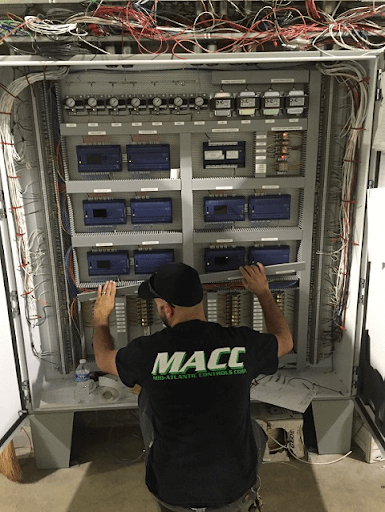
The goal of any maintenance program is to extend your equipment’s life and avoid costly breakdowns. When it comes to building management, an automation system that monitors and controls systems (such as temperature, lighting, and security) can support facility maintenance and help keep tenants comfortable and safe.
A well-balanced maintenance program includes not only checking equipment but also the building automation controls themselves. Having a qualified technician routinely inspect your building automation system makes a big difference in process improvements, equipment performance, and overall energy efficiency.
Maintaining Building Systems Is Complex
From office buildings to university campuses to hospitals, modern facilities use multiple mechanical and electrical systems to create comfortable indoor conditions. For example:
HVAC (heating, ventilation, air conditioning) – Maintains air quality and regulates indoor temperatures
Lighting Systems – Illumination improves comfort and safety (ex. meeting room dimmers or parking lot floodlights)
Security Systems – Prevent theft and limit entry to authorized personnel
Humidity Controls – Regulate moisture to keep occupants comfortable and protect materials from damage in laboratories or food storage areas
Hundreds of components must work together for these systems to function correctly, including:
- Air handlers
- Dampers
- Valves
- Fans
- Blowers
- Chillers
- Boilers
- Pumps
A comprehensive maintenance program inspects these equipment parts regularly, catching small problems before they become serious issues. Many building owners don’t realize that it’s also important to maintain your building automation system (BAS).
What Happens When You Don’t Maintain Your BAS?
HVAC systems and other equipment are more susceptible to breakdowns when a facility’s preventive maintenance program doesn’t cover its control systems. The result may be costly emergency repairs or replacements, in addition to unhappy tenants.
The following problems can arise when your BAS doesn’t get the maintenance it needs:
Overworking the system
Components wearing out before their time is an indication that a technician should inspect your BAS controls. If your BAS isn’t checked it could be working overtime to meet setpoints that are no longer optimal.
Short-cycling
When equipment turns on and off repeatedly, it’s called short-cycling, and it puts a strain on components, wearing them out quickly. Short-cycling can happen when BAS controls don’t have the proper setpoints or aren’t sending the right signals to the equipment—a technician will be able to diagnose and correct the issue.
Sensor failure
BAS controls rely on sensors for feedback to ensure building systems work the way they’re supposed to. Without maintenance, sensors can drift, causing improper readings and inadequate response.
Stuck actuators
If the controls aren’t working, the equipment won’t either. Actuators—the devices that open and close valves—can get stuck or begin to respond slowly. This is especially problematic for a building’s HVAC system, which relies on valves to function properly.
Equipment replacement
Undiagnosed control issues will seriously affect your building’s systems and shorten the lifespan of facility equipment. Without knowledgeable maintenance, BAS problems may be misdiagnosed as equipment issues, eventually leading to unnecessary replacements.
What Does Building Automation Maintenance Involve?
Your BAS will help you extend equipment lifespan and maximize the building’s energy usage. Proper upkeep ensures things run smoothly. But maintenance is about more than that—it’s also about improving the basic controls design.
Modifying and improving control schemes
A BAS control scheme is a sophisticated way to automate temperature, humidity, lighting, etc., throughout your facility. Performing maintenance gives a technician the chance to evaluate the current scheme and modify the controls' functionality.
The more familiar a technician is with your building, the more improvements they’ll be able to make to the system because, often, there’s more than one way to attain your setpoints and targets.
Optimizing sequences
Control sequences are the highly complex steps needed to operate building equipment. They involve programming a system using inputs (such as temperature and pressure readings) and commands to operate the equipment (such as opening a valve or closing a damper).
A technician familiar with your controls system can examine your BAS sequences to ensure you’re achieving peak equipment performance while minimizing energy use.
Updating software
Keeping BAS software up-to-date gives you access to the latest improvements, newest features, and the most current cybersecurity.
MACC’s Building Automation Maintenance Services
At MACC, we provide maintenance for a variety of BAS manufacturers. We’re dedicated to helping you get the most out of your BAS by providing services that extend the life of your systems and keep your building equipment working reliably and efficiently.
BAS maintenance is one of the best ways to prevent breakdowns while maximizing energy savings. With MACC, you can choose the maintenance plan options that suit you best.
We offer:
- Labor only
- Labor & parts
- Annual & multi-year contracts
- Reduced, contract pricing for parts
- Preferred customer response times
- 24/7 emergency service with guaranteed response times
Our skilled technicians work with you to understand your needs, and all of our packages come with customized BAS Maintenance Reports with actionable advice and suggestions to help you get the most from your system.
Ready to work with experts dedicated to supporting your success? Click below to learn more about our BAS maintenance services.













